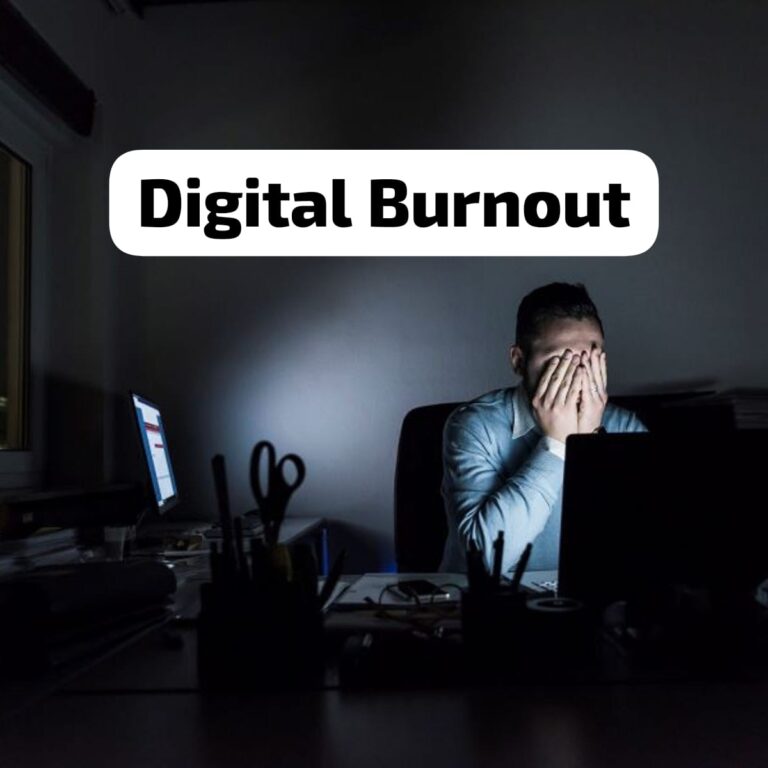
How to Recognize and Overcome Job Burnout: A Practical Guide
Job burnout is more than just feeling tired from work—it’s a deeper, chronic kind of stress that can leave you mentally, emotionally, and physically drained. Whether it’s long hours, unclear expectations, or simply feeling like your work doesn’t matter, burnout can slowly erode your motivation, productivity, and even your health.
Burnout isn’t just about feeling tired after a long day. It’s a deeper form of emotional, physical, and mental exhaustion caused by prolonged, unmanaged stress at work. Think of it like your inner battery being drained every day, and no matter how much you rest, it never really charges back up.
Job Burnout isn’t an official medical diagnosis, but it’s very real. In fact, it often mimics symptoms of depression and anxiety — and if left unchecked, can affect both your health and your ability to function normally at work and in your personal life.
Let’s break down how to identify the signs of burnout, explore what causes it, and learn what steps you can take to recover your energy, confidence, and peace of mind.
♦ What Exactly is Job Burnout?
Job Burnout is a state of emotional, physical, and mental exhaustion caused by excessive and prolonged stress. It isn’t an official medical condition, but its impact is very real. You might feel helpless, detached, unmotivated, or completely worn out—even when you’re doing the work you used to enjoy.
It’s important to note: burnout and depression share symptoms, but they’re not the same. While burnout is job-related, depression often extends beyond work into other areas of life. However, left unchecked, burnout can lead to serious health issues, including depression.
♦ Signs You Might Be Experiencing Burnout
Ask yourself the following:
- Do you dread going to work every day?
- Are you emotionally distant from your job or coworkers?
- Have you stopped caring about your performance or results?
- Do you feel chronically tired or drained—mentally and physically?
- Have you been getting frequent headaches, stomachaches, or sleep issues?
- Are you unusually irritable, anxious, or frustrated at work?
- Have you started coping with food, alcohol, or other substances?
# Red flags: Don’t ignore these common signs
- Feeling disconnected from your job — like it no longer matters.
- Dreading Mondays (and Tuesdays, and every day).
- Getting irritated by coworkers or customers more easily than usual.
- Struggling to concentrate, even on simple tasks.
- Feeling like nothing you do is ever enough.
- Using food, alcohol, or mindless scrolling just to numb yourself.
- Constant headaches, stomach issues, or messed-up sleep.
- Feeling hopeless, helpless, or emotionally drained.
- If a few of those sound familiar, you’re not alone — and you don’t have to stay stuck there.
If any of these resonate, it’s time to pay attention—these are classic signs of Job Burnout.

♦ How to Fix Burnout: Real Strategies That Work
1. Talk About It
Don’t suffer in silence. Communicate your concerns with your manager or HR. Propose realistic solutions—like adjusting deadlines, delegating work, or using better tools.
2. Reconnect with People
Burnout often thrives in isolation. Try to build stronger social connections at work or spend more time with friends and family outside of it. Belonging can be a powerful buffer against stress.
3. Set Clear Boundaries
Don’t let your job bleed into your evenings. Set a time to stop checking emails or doing tasks after hours. Protect your personal time—it’s sacred.
4. Reignite Your Passions
Make time for hobbies or creative outlets you love. Whether it’s painting, music, or gardening, doing something just for yourself can renew your energy.
5. Prioritize Self-Care
Get regular sleep, eat well, drink enough water, and stay active. Even small habits like a morning walk or 10 minutes of meditation can make a big difference.
6. Seek Support
Reach out to a therapist, career coach, or mental health professional. Sometimes, talking to someone trained to help can give you the clarity and direction you need.
7. Know When to Move On
If you’ve tried everything and your job still leaves you exhausted and hopeless, it might be time to consider a change. Make a list of what you need in a new job—better culture, clear goals, supportive management—and start your search.
♦ Preventing Burnout in the Future
Job Burnout recovery is just the beginning. Here’s how to keep it from coming back:
- Shift your mindset: Practice gratitude for the good parts of your work.
- Optimize your routine: Plan your day around your energy peaks.
- Keep growing: Boredom can lead to burnout—keep learning and exploring.
- Be intentional with jobs: When job-hunting, look for roles aligned with your values, work style, and long-term goals.
- Reassess your work habits: Are you working when you’re most energized? Do you schedule breaks or just push through?
- Learn to say no (nicely). Overcommitting is a fast track to stress.
♦ Why Burnout Happens (Even in Jobs You Once Loved)
Job Burnout doesn’t always stem from being “too busy.” Sometimes, it’s caused by lack of meaning, poor communication, or feeling unsupported.
Here are a few of the usual culprits:
- Lack of control over your tasks, schedule, or environment.
- Unclear expectations — when you’re always guessing what’s “good enough.”
- Toxic work culture — passive-aggressive coworkers, micromanagers, or just a lack of support.
- Overload — too much to do, or too little to feel challenged.
- No work-life balance — when your laptop follows you to dinner, bed, and even your vacation. Sometimes, the stress isn’t from the work itself but from the way you’re working.
- Lack of recognition or growth: Feeling stuck or underappreciated.
♦ When It’s Time to Walk Away
Let’s be real — sometimes the best fix isn’t “coping” better. If your job is draining you beyond repair, it’s okay to start looking elsewhere. Signs it might be time to move on:
- Your complaints are ignored or dismissed.
- The culture is actively harming your well-being.
- You feel like you’ve outgrown the role or the company.
- Your personal life is crumbling because of work stress.
Leaving isn’t failure. It’s choosing peace.
♦ Thee true impact of Job Burnout & How to overcome it:
Recognizing job burnout is crucial in today’s fast-paced professional world. More and more individuals are silently struggling with job burnout without even realizing it. When work-related stress goes unmanaged for a long time, it often leads to job burnout, a state of emotional, physical, and mental exhaustion caused by prolonged exposure to stressful situations at work. This condition doesn’t develop overnight. Job burnout creeps in gradually, often disguised as simple tiredness, demotivation, or frustration. If you’ve ever felt emotionally drained, constantly overwhelmed, or completely detached from your professional responsibilities, chances are you might be experiencing job burnout.
Job burnout can affect anyone — from fresh graduates to seasoned professionals. Whether you’re working remotely, freelancing, or hustling through a demanding office schedule, the risk of job burnout is real. One of the biggest mistakes people make is ignoring early warning signs such as irritability, lack of concentration, fatigue, and feelings of failure. Instead of dismissing these as “just stress,” it’s important to evaluate whether they could be symptoms of job burnout. Once job burnout sets in, it can impact not only your work performance but also your physical health, relationships, and overall happiness.
The effects of job burnout go far beyond the workplace. It can cause sleep disturbances, digestive issues, chronic headaches, and even lead to anxiety and depression. That’s why recognizing job burnout early and taking proactive steps to recover from it is vital. From setting healthy boundaries to practicing mindfulness, there are countless ways to prevent job burnout. Creating a balanced work-life routine, scheduling regular breaks, and prioritizing self-care are all practical ways to reduce the likelihood of job burnout taking over your life. Also, seeking support from mentors, colleagues, or mental health professionals can go a long way in fighting job burnout.
One overlooked aspect of job burnout is how it influences your passion and creativity. When job burnout hits, you begin to lose interest in things you once enjoyed. Tasks feel meaningless, and you start questioning your career path. This emotional depletion often leads to decreased productivity, increased absenteeism, and sometimes, complete career shifts. That’s why companies today must create awareness about job burnout and invest in their employees’ mental wellness. Recognizing and overcoming job burnout is not just an individual effort — it should be a collective goal for healthier work environments.
In conclusion, job burnout is more than just being tired — it’s a serious condition that demands attention. By understanding the root causes of job burnout and implementing preventive strategies, you can protect yourself from falling into its trap. Remember, your mental well-being is just as important as meeting deadlines or achieving targets. If you feel you might be suffering from job burnout, don’t hesitate to pause, reflect, and take action. Addressing job burnout head-on is the first step toward reclaiming your energy, motivation, and joy at work.
♦ Final Thoughts
Job Burnout isn’t weakness—it’s a signal. A sign that something needs to change. The good news? You’re not stuck. With the right steps, support, and self-care, you can move from exhausted to empowered.
Job Burnout is heavy — but you’re not alone in this. You deserve to enjoy your work, not just survive it. And more than anything, you deserve to protect your mind, body, and heart from a life that asks too much and gives too little in return.
Remember: your well-being is worth protecting. You deserve to feel fulfilled, respected, and energized—not just at work, but in life too.
Small changes can lead to big shifts. Start where you are, with what you have — and be kind to yourself along the way.
DoFollow :
Overthinking – अगर ये 5 बातें आप रोज़ सोचते हो, तो ये ब्लॉग आपके लिए है!
Government Jobs 2025: The Ultimate Guide To Secure Your Future




